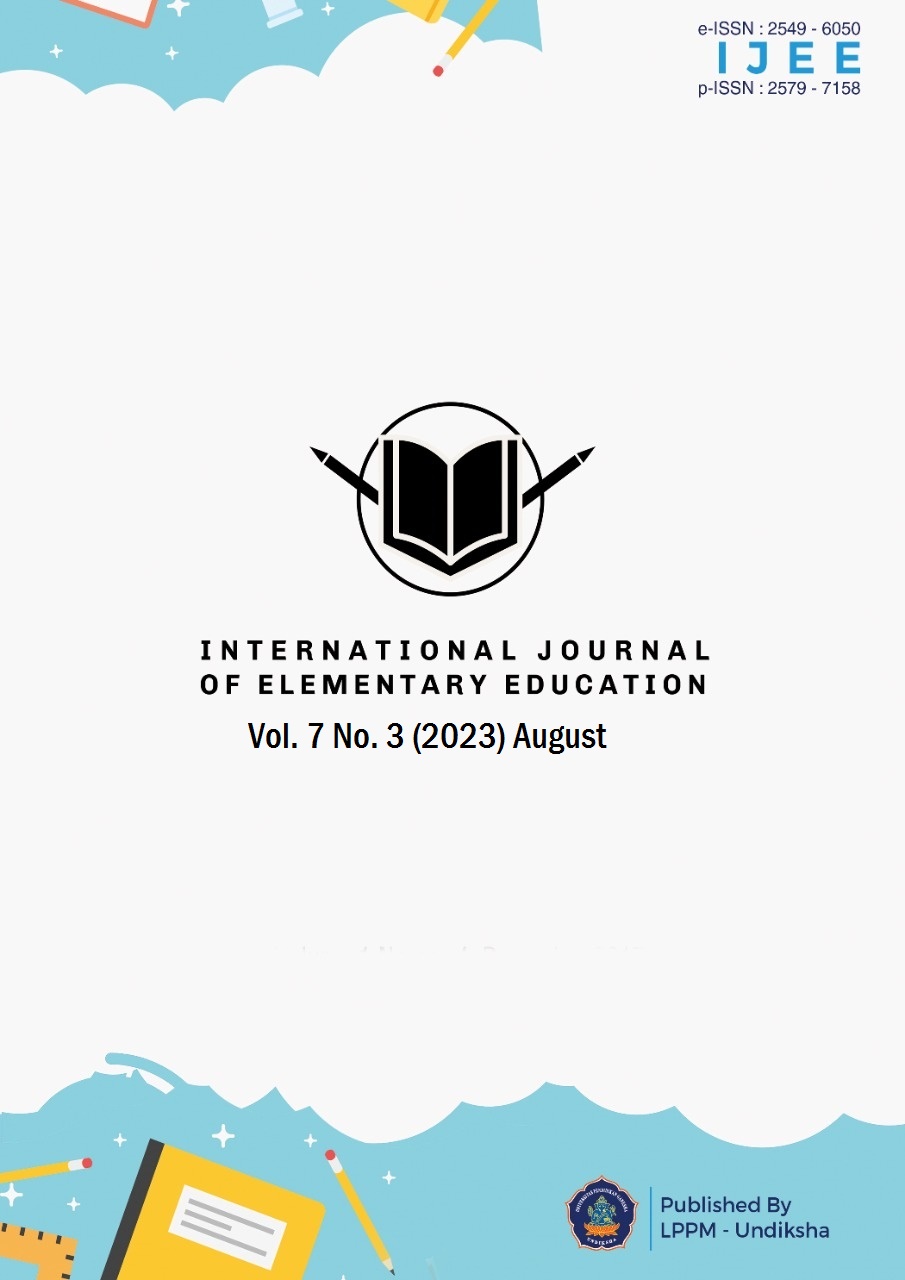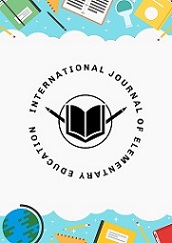Scout Practice Digital Teaching Module on the Topic of Scout Knots for Elementary School Students
DOI:
https://doi.org/10.23887/ijee.v7i3.61533Keywords:
Digital Teaching Module, Practice, Scouting, KnotsAbstract
This research is motivated by problems in Scouting learning that are still confessional so that they are not effectively understood and the use of digital technology that has yet to be maximized. This research aims to develop a quality Digital Teaching Module for Elementary Scout Practices by testing its validity and practicality. This type of research is Research and Development with the ADDIE model. The subjects of this study were two media experts, two material experts, two design experts, two lecturers, and 12 students who had attended scouting lectures. The data collection method used was a questionnaire with an instrument in the form of a rating scale sheet. The data analysis techniques used are descriptive, qualitative, and quantitative. The results showed that: (1) the developed media prototype consists of 3 main parts, namely the opening, core, and closing views; (2) the validity test results show an average score of 93.83% material experts, 96.66% design experts and 95.33% media experts with very good qualifications, (3) the results of the practicality test show an average individual test score of 97.5%, small group test 98.61% and by practitioners of 96.66%. This study concludes that the digital teaching module for elementary scout practices developed is very valid and practical to be developed in learning.
References
Adri, H. T., & Erlina. (2022). Perspektif Mahasiswa Pada Matakuliah PendidikanKepramukaan di Proram Studi PGSD Universitas Djuanda. THE JOER: Journal Of Education Research, 1(2), 158–163. http://pedirresearchinstitute.or.id/index.php/THEJOER/article/view/139.
Ali Mustadi, dkk. (2020). Landasan Pendidikan Sekolah Dasar. UNY Press.
Alimuddin. (2014). Penilaian Pembelajaran Dalam Implementasi Kurikulum 2013. Seminar Nasional Pendidikan Karakter. https://doi.org/https://jbasic.org/index.php/basicedu/article/view/3149.
Aprilliyah. (2014). Pengembangan Media Pembelajaran Modul Interaktif Pada Materi Jurnal Khusus Kelas X Akuntansi di SMK Negeri Mojoagung. Jurnal Khusus, 2(2), 1–7. https://jurnalmahasiswa.unesa.ac.id/index.php/35/article/view/9412.
Arifudin, O. (2022). Optimalisasi Kegiatan Ekstrakurikuler dalam Membina Karakter Peserta Didik. JIIP-Jurnal Ilmiah Ilmu Pendidikan, 5(3), 829–837. https://doi.org/https://doi.org/10.54371/jiip.v5i3.492. DOI: https://doi.org/10.54371/jiip.v5i3.492
Ariyanti, N. D., & Maryanti, R. (2022). Developing the Creativity of Elementary School Students in Cimahi , Indonesia Through Online Learning Media During the COVID-19 Pandemic. Indonesian Journal of Teaching in Science, 2(1), 7–16. https://doi.org/http://dx.doi.org/10. 17509/xxxxt.vxix. DOI: https://doi.org/10.17509/ijotis.v2i1.37391
Artha, W. A., & Putra, dewa bagus ketut ngurah. (2021). Pengembangan Media Audio Visual Dengan Model Analysis Design Development Imlementation Evaluation Pada Muatan IPA Kelas IV SD Negeri 2 Pejeng Tahun Ajaran 2020/2021. Jurnal Edutech Undiksha, 9(1), 149–157. https://doi.org/10.23887/jeu.v9i1.32974. DOI: https://doi.org/10.23887/jeu.v9i1.32974
Asrivi, Q. E. S. (2020). Implementasi Pendidikan Karakter Melalui Gerakan Pramuka Sebagai Ekstrakurikuler Wajib Pada Kurikulum 2013 Sekolah Dasar Di Masa Pandemi Covid-19. Tunas Nusantara, 2(2), 255–268. https://ejournal.unisnu.ac.id/jtn/article/view/1483. DOI: https://doi.org/10.34001/jtn.v2i2.1483
Bomans Wadu, L., Samawati, U., & Ladamay, I. (2020). Penerapan Nilai Kerja Keras Dan Tanggung Jawab Dalam Ekstrakurikuler Pramuka Di Sekolah Dasar. Jurnal Bidang Pendidikan Dasar (JBPD), 4(1), 100–106. https://doi.org/10.21067/jbpd.v4i1.3571.
Dewi, S. K., & Sudaryanto, A. (2020). Validitas dan Reliabilitas Kuesioner Pengetahuan, Sikap dan Perilaku Pencegahan Demam Berdarah. Junal Pendidikan Jasmani Indonesia, 4(1), 73–79. https://publikasiilmiah.ums.ac.id/xmlui/handle/11617/11916.
Fathinnaufal, M., & Hidayati, D. (2020). The implementation of character education in elementary school. Journal of Educational Management and Leadership, 1(2), 31–38. https://doi.org/10.33369/jeml.v1i2.11687. DOI: https://doi.org/10.33369/jeml.1.2.31-38
Fauziyyah, B. S. (2020). Program Ekstrakulikuler Di Sekolah Dasar. Jurnal Pendidikan Dasar, 4(1), 35–40. https://doi.org/https://ejournal.stitpn.ac.id/index.php/fondatia. DOI: https://doi.org/10.36088/fondatia.v4i1.512
Gerdruang, A., & Panwatanasakul, C. (2021). The Desirable Management Of Education In Urbanization Area Under The Office Of Non-Formal And Informal Education In Bangkok. Journal of Hunan University, 48(10), 1022–1039. https://doi.org/https://doi.org/10.1177/00131644 7003000308.
Haerulah, E. (2020). Dimensi Perkembangan Pendidikan Formal dan Non Formal. Jurnal Edukasi Nonformal, 5(2). https://ummaspul.e-journal.id/JENFOL/article/view/504.
Hikmawan, F. (2017). Perspektif Filsafat Pendidikan Terhadap Psikologi Pendidikan Humanistik. Jurnal Sains Psikologi, 6(1), 31. https://doi.org/10.17977/um023v6i12017p31-36. DOI: https://doi.org/10.17977/um023v6i12017p31-36
Kimianti, F., & Prasetyo, Z. K. (2019). Pengembangan E-Modul IPA Berbasis Problem Based Learning Untuk Meningkatkan Literasi Sains Siswa. Kwangsan Jurnal Teknologi Pendidikan, 07(02), 91–103. https://doi.org/10.31800/jtp.kw.v7n2.p91--103 PENGEMBANGAN. DOI: https://doi.org/10.31800/jtp.kw.v7n2.p91--103
Kolodych, D. (2019). Development Features Of Emotional Intellegence In The Conditions Of Informal Education (Cross Cultural Aspect). “socialization & Human Development” International Journal, 6(1), 5–13. https://doi.org/https://doi.org/10.37096/SHDISJ-20-1.1-0001. DOI: https://doi.org/10.37096/SHDISJ-20-1.1-0001
Kurnia, T. D., Lati, C., Fauziah, H., & Trihanton, A. (2019). Model ADDIE Untuk Pengembangan Bahan Ajar Berbasis Kemampuan Pemecahan Masalah Berbantuan 3D. Seminar Nasional Pendidikan Matematika, 1(1), 516–525. http://www.fkip-unswagati.ac.id/ejournal/index.php/snpm/article/view/844.
Kurniawan, M. I. (2013). Integrasi Pendidikan Karakter Ke Dalam Pembelajaran Kewarganegaraan Di Sekolah Dasar. Jurnal Pemikiran Dan Pengembangan Sekolah Dasar (JP2SD). https://doi.org/10.22219/jp2sd.v1i1.1528. DOI: https://doi.org/10.22219/jp2sd.v1i1.1528
Kusmarheni, F., Wiarsih, N., & Meliantina. (2022). Pengembangan Modul Pramuka Penggalang di SD Islam Kebunrejo Genteng. Atta’lim: Jurnal Madrasah Ibtidaiyah, 1(2), 94–106. https://doi.org/http://ejournal.iaiibrahimy.ac.id/index.php/attaklim/article/view/1531.
Mawanto, A. (2022). Pengaruh Media Video Pembelajaran Terhadap Hasil Belajar IPA Materi Siklus Air Kelas V SD Negeri Lontar II Surabaya. Jurnal on Education, 04(04), 1264–1271. https://doi.org/10.31004/joe.v4i4.542. DOI: https://doi.org/10.31004/joe.v4i4.542
Merac, E. R. du. (2015). What We Know about the Impact of School and Scouting on Adolescents ’ Value-based Leadership. ECPS Journal, 11, 207–224. https://doi.org/10.7358/ecps-2015-011-dume. DOI: https://doi.org/10.7358/ecps-2015-011-dume
Muhammad Ali, R. (2014). Lingkungan Pendidikan dalam Implementasi Pendidikan Karakter. Jurnal Pendidikan Universitas Garut, 8(1), 28–37. https://etheses.uinsgd.ac.id/id/eprint/5122.
Ngainin, N. (2022). Implikasi Metode Game Based Learning Pada Pembelajaran Mata Kuliah Kepramukaan Terhadap Mahasiswa PGMI. Eduthink: Jurnal Pemikiran Islam, 03(02), 68–76. http://ejournal.iaimu.ac.id/index.php/eduthink/article/view/163.
Noor, T. (2018). Rumusan Tujuan Pendidikan Nasional Pasal 3 Undang-Undang Sistem Pendidikan Nasional No 20 Tahun 2013 Melalui Pendekatan Nilai-Nilai Yang Terkandung Dalam Ayat 30 Surah Ar-Ruum dan Ayat 172 Surah Al-‘Araaf. Universitas Singaperbangsa Karawang, 20, 123–144. https://journal.unsika.ac.id/index.php/pendidikan/article/view/1347.
Nurhaidah, & Musa, M. I. (2015). Dampak Pengaruh Globalisasi Bagi Kehidupan Bangsa Indonesia. Jurnal Pesona Dasar, 3(3), 1–14. https://jurnal.usk.ac.id/PEAR/article/view/7506.
Pouratashi, M. (2021). The Influence of Formal and Informal Education on Students ’ Sustainable Development Skills , a Study in Iran. Zagreb International Review of Economics & Business, 24(2), 25–35. https://doi.org/10.2478/zireb-2021-0009. DOI: https://doi.org/10.2478/zireb-2021-0009
Pratiwi, S. I., Kristen, U., Wacana, S., Salatiga, K., & Tengah, J. (2020). Pengaruh ekstrakurikuler pramuka terhadap karakter disiplin siswa sd. Edukatif: Jurnal Ilmu Pendidikan, 2(1), 62–70. https://core.ac.uk/download/pdf/322536542.pdf. DOI: https://doi.org/10.31004/edukatif.v2i1.90
Rahmadhani, S., Okra, R., Efriyanti, L., & Kunci, K. (2022). Pengembangan Buku Elektronik ( E - Book ) sebagai Media Pembelajaran Ekstrakurikuler Wajib Pramuka. Indonesian Journal of Innovation Learning and Technology, 01(01), 88–97. https://doi.org/https://10.57255/intellect.v1i1.50.
Rayanto, Y. H., & Sugianti. (2020). Penelitian Pengembangan Model ADDIE &R2D2. Lembaga Akademik Research Institut: Pasuruan.
Rohanah, Rahmawati, I., & Agustini, F. (2020). The Implementation of Scouting Extracurricular in Building Students ’ Character. International Journal of Elementary Education, 4(3), 400–405. https://doi.org/10.23887/ijee.v4i3.27963. DOI: https://doi.org/10.23887/ijee.v4i3.27963
Safitri, I., Marsidin, S., & Subandi, A. (2020). Analisis Kebijakan terkait Kebijakan Literasi Digital di Sekolah Dasar. Edukatif: Jurnal Ilmu Pendidikan, 2(2), 176–180. https://doi.org/https://dx.doi.org/10.31004/edukatif.v2i2.123. DOI: https://doi.org/10.31004/edukatif.v2i2.123
Saipul, A. D. (2017). Pengaruh Pendidikan Kepramukaan Terhadap Kedisiplinan Mahasiswa Pendidikan Jasmani , Kesehatan dan Rekreasi FIK UNIMED . Jurnal Ilmu Keolahragaan, 16(2), 68–74. https://doi.org/10.24114/jik.v16i2.8318.
Sastradipura, R. A., Dewi, D., & Furnamasari, Y. F. (2021). Peran Guru Pendidikan Kewarganegaraan dalam Meningkatkan Rasa Nasionalisme pada Siswa Sekolah Dasar. Jurnal Pendidikan Tambusai, 5(3), 8629–8637. https://edukatif.org/index.php/edukatif/article/view/1570.
Smaragdina, A. A., Nidhom, A. M., Soraya, D. U., & Fauzi, R. (2020). Pelatihan pemanfaatan dan pengembangan bahan ajar digital berbasis multimedia interaktif untuk menghadapi Era Revolusi Industri 4.0. Jurnal Karinov, 3(1), 53–57. https://doi.org/10.17977/um045v3i1p53-57. DOI: https://doi.org/10.17977/um045v3i1p53-57
Supriyanto, R., & Farhan. (2020). Manajemen Team Teaching Mata Kuliah Kepramukaan. Bidayatuna, 3(1), 1–6. https://ejournal.iaisyarifuddin.ac.id/index.php/bidayatuna/article/view/514. DOI: https://doi.org/10.36835/bidayatuna.v3i01.514
Syarifuddin, Ilyas, J. B., & Sani, A. (2021). Pengaruh Persepsi Pendidikan dan Pelatihan Sumber Daya Manusia pada Kantor Dinas di Kota Makassar. Bata Ilyas Educational Management Review, 1(2), 51–56. https://doi.org/https://doi.org/10.37531/biemr.v1i2.102.
Tiara, S. K., & Sari, E. Y. (2019). Analisis Teknik Penilaian Sikap Sosial Siswa Dalam Penerapan Kurikulum 2013 Di Sdn 1 Watulimo. EduHumaniora | Jurnal Pendidikan Dasar Kampus Cibiru. https://doi.org/10.17509/eh.v11i1.11905. DOI: https://doi.org/10.17509/eh.v11i1.11905
Triwiyanto, T. (2021). Pengantar Pendidikan. Bumi Aksara.
Ulya, A., Pendidikan, J., & Volume, I. (2018). Pengaruh Kegiatan Pramuka Terhadap Karakter Siswa Madrasah Ibtidaiyah Di Era Digital. Al Ulya: Jurnal Pendidikan Islam, 3(1), 26–38. https://doi.org/10.32665/ulya.v3i1.694.
Wasitohadi, W. (2014). Hakekat Pendidikan Dalam Perspektif John Dewey Tinjauan Teoritis. Satya Widya, 30(1), 49. https://doi.org/10.24246/j.sw.2014.v30.i1.p49-61. DOI: https://doi.org/10.24246/j.sw.2014.v30.i1.p49-61
Wati, D. A., Pranawa, S., & Rahman, A. (2020). Upaya pengembangan soft skill siswa SMA melalui pramuka. Perspektif Ilmu Pendidikan, 34(2), 117–124. https://doi.org/10.21009/PIP.342.6. DOI: https://doi.org/10.21009/PIP.342.6
Winandari, A., Sutimin, L. A., & Rejekiningsih, T. (2022). Benefits of Using Experiential Learning Based Electronic Modules to Facilitate Students Concierge Learning in Vocational High Schools. Journal of Education and Technology, 6(4), 568–577. https://doi.org/10.23887/jet.v6i4.48064. DOI: https://doi.org/10.23887/jet.v6i4.48064
Zaharah, Z., & Susilowati, A. (2020). Meningkatkan Motivasi Belajar Peserta Didik Dengan Menggunakan Media Modul Elektronik Di Era Revolusi Industri 4.0. Biodik, 6(2), 145–158. https://doi.org/10.22437/bio.v6i2.8950. DOI: https://doi.org/10.22437/bio.v6i2.8950
Downloads
Published
How to Cite
Issue
Section
License
Copyright (c) 2023 Devi Janisa

This work is licensed under a Creative Commons Attribution-ShareAlike 4.0 International License.
Authors who publish with the International Journal of Elementary Education agree to the following terms:
- Authors retain copyright and grant the journal the right of first publication with the work simultaneously licensed under a Creative Commons Attribution License (CC BY-SA 4.0) that allows others to share the work with an acknowledgment of the work's authorship and initial publication in this journal.
- Authors are able to enter into separate, additional contractual arrangements for the non-exclusive distribution of the journal's published version of the work (e.g., post it to an institutional repository or publish it in a book), with an acknowledgment of its initial publication in this journal.
- Authors are permitted and encouraged to post their work online (e.g., in institutional repositories or on their website) prior to and during the submission process, as it can lead to productive exchanges, as well as earlier and greater citation of published work. (See The Effect of Open Access)










